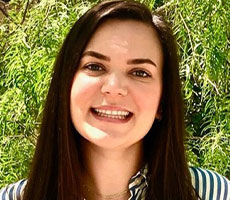A Student Perspective
The Aurora Health Alliance Specialty Care Access Project
Oct 24, 2022
About the author:
Emily Larson is a Class of 2020 graduate from The University of Arizona with her Bachelor of Science in Psychological Science and a minor in Spanish. Originally a pre-medical student, Emily has work experience in the clinical environment and the non-profit sector. She has also collaborated on research projects involving social determinants of health and health equity since 2017. A community project she is most proud of is the Rural Opioid Response Project implemented by Amistades, Inc. in rural, Latino communities of Southern Arizona. The program is helping to curb opioid use in vulnerable populations and emphasize prevention in its youth. Emily is currently pursuing a doctoral education in health behavior and health promotion to further efforts in the elimination of health disparities through a culturally sensitive, community-centered lens.
Rigid issues of accessibility in healthcare require dynamic solutions with interdisciplinary teamwork at its heart. This is exactly the collaboration occurring within the Aurora Health Alliance Specialty Care Access Project to help mitigate the impact of lack of specialty care on underserved medical communities of Aurora, Colorado.
The Aurora Health Alliance Specialty Care Access Project aims to identify barriers to specialty care for uninsured patients and patients with Medicaid, which are understood as independent populations in healthcare. Barriers have been identified through community health provider survey response at Federally Qualified Health Centers (FQHCs) and include income inequality, lack of transportation, language differences, and provider refusal of patients without private health insurance.
It should be noted that many of these barriers are traditionally considered issues of non-adherence in the medical field. However, this project dismantles this belief by further assessing the root causes of inaccessibility and non-adherence. For example: Is non-compliance an attitude towards treatment plans or the result of an absence of resource and support? The Aurora Health Alliance Specialty Care Access Project places an emphasis on establishing systems that reinforce health behavior by increasing the efficiency at which patients are channeled to different systems of care. More specifically, we are aiming to increase the efficiency by which underserved patients receive specialty care.
Ultimately, this project will result in the collaboration of our team in Diversity and Health Equity, the Aurora Health Alliance, and community health centers to provide specialty care access (prioritizing medical specialties deemed most necessary to patients by providers and referral specialists).
Projects like this are not only impactful to their community, but are also instrumental in developing a student’s research skill set. Community-based research projects hold the potential for students to develop and refine skills in data collection and data organization, as well as writing syntax for data analyses on programs such as SAS, SPSS, and R. Experience in this diverse field is useful to students entering graduate school and the workforce alike. Student investment provides the opportunity to learn from researchers, data managers, public health officials, physicians, and fellow students. Interdisciplinary teamwork is the future of healthcare, from both a community and national lens, which is often forgotten at the undergraduate level.
I encourage students interested in healthcare at any level (allopathic medicine, healthcare administration, psychology, community health/wellbeing non-profit, and beyond) to consider assessing their community’s needs right where they reside. How is the community affected by specialty care access, substance abuse, violence in the community and the home, lack of funding in public education, or underdeveloped preventative healthcare systems? Which social determinant of health rings true to you when you think about your community? This is where transformational work begins. Make your motive personal and exhaust your resources.
As a student volunteering on this project, my efforts have reinforced the notion that public health projects centered around community needs are necessary to transform healthcare as we all know it. These projects are not always pretty. It takes dedication, purpose, and a bit of idealism to achieve such lofty goals. Most important of all, it takes a community, with all hands on deck, to heal a community. Health inequity is characterized by the community in which the disparity lies. Through a community lens, those with commitment to eliminating health disparities will find the resource to lead their neighbors to healthier, happier futures. I hope you will join us.